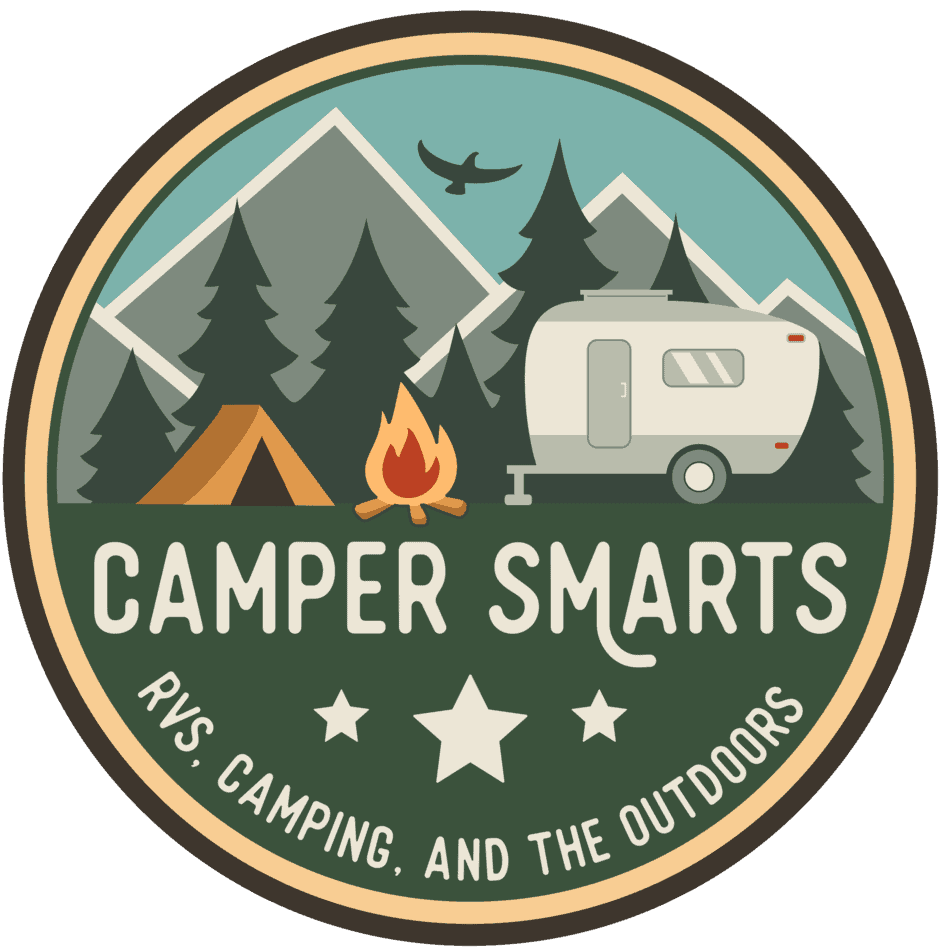Are you considering full-time RV living? Many people dream of having the freedom to do what they want, when they want, by leaving their jobs and home and start traveling full time in an RV. This dream sounds idyllic, but what is the reality of full-time RVing?
With nearly five years of full-time RV living and travel under my belt, I think I have dealt with most issues concerning this way of life. In this guide, I talk about full-time camper living benefits and challenges and share with you my biggest regret.
Come along as I discuss the nitty-gritty of RV living like:
- Driving
- Weather
- Budgets
- Working
- Storage space
- Maintenance
- Campground issues
- Personal space
- Cooking
This overview will give you the positives and negatives of each topic, so you can decide for yourself if the full-time RV lifestyle is the road you want to travel.
Full-Time RV Living Positives and Negatives
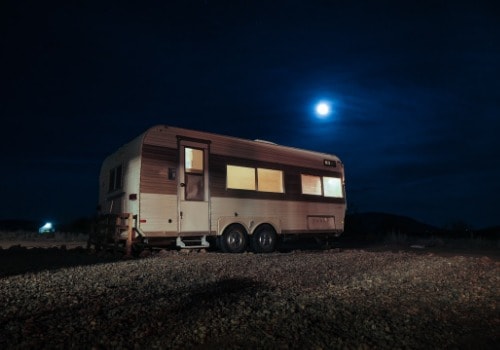
My decision to full-time RV has led to a reduction in stress from the demands of a job, house maintenance, utility bills, and the congestion of living in an urban area. The places I have seen and the people I have met has been unbelievable.
While I preach the benefits of this lifestyle to anyone who will listen, it does take a certain attitude toward life to enjoy it fully and overcome the negative aspects that are inherent in full-time RV living.
In this section, I will cover the main topics of interest for those wishing to learn more about what it’s really like living and traveling in a camper full time.
#1 – RV Driving
No matter how much experience you have towing an RV, you must always stay vigilant. This vigilance can lead to mental and physical fatigue after just a few hours and is why most full-timers only drive 4-5 hours a day.
Everywhere you go, you’ll encounter obstacles that you must maneuver your large, long RV through and around. Let’s look at issues when driving and parking your camper.
Highway Driving
When you are cruising in your recreational vehicle down the highway on a beautiful, sunny day, you feel like you are on top of the world!
The stunning countryside, the excitement of reaching your next destination, and the freedom from time and obligation constraints make these moments unforgettable. Times like this make you feel like your decision to full-time RV was the best one of your life.
You must slow down, both figuratively and literally, because rushing can cause disastrous results. So you learn to enjoy the slow lane and clear your mind of useless worries and concentrate on the sights and sounds of your current location.
Living in the present becomes second-nature after several years on the road. You appreciate all sorts of little things you never could relax enough to notice before.
But living in the present while driving your RV down the highway in a downpour at night, battling high winds and semi-trucks passing within inches of your camper is enough to make you rethink your decision to live such a life.
Driving conditions will end up playing a significant role whenever you head out to your next destination.
Trust me when I say that pulling into a parking lot and missing out on your first night’s site rent at a new campground is well worth staying safe. Or you can take your chances and potentially spend hours with a death-grip on the steering wheel of your motorhome or tow vehicle while you hyperventilate as you drive through a storm.
When your camper is your home, taking unnecessary risks is foolish. Nobody wants to get injured, and have their camper in pieces and belongings scattered along the side of the road. This is why reading up on tips for driving in inclement weather is important, because you never know what you will encounter.
Parking
On rare occasions, you pull into a campground that offers a true pull-through campsite, or you find wide open lanes when you stop at a gas station. When this happens, you thank the RVing gods for bestowing such blessings upon you.
In reality, you’ll have tense moments when backing into tight campsites and pulling into busy gas stations and parking lots. You never get used to the uncomfortable squeeze you feel in your chest when you need to quickly and safely find a way to get your camper into a tight area.
Sorry, but there is no positive aspect to parking your RV. I will state the smaller your motorhome or trailer, the easier parking your camper will be. Going slow and knowing how much swing-out the rear of your RV has will help when navigating in tight quarters. Back-up cameras and having a co-pilot to assist are another plus to help you park.
I suppose that nice deep breath you take after you successfully park your camper is a positive!
#2 – Weather
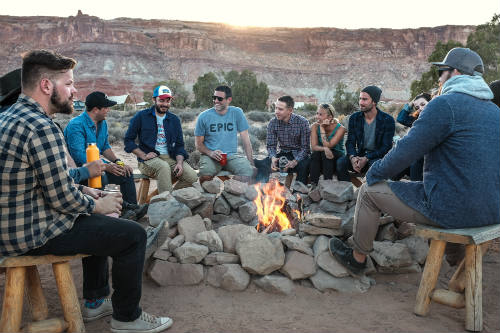
I read many horror stories of roof leaks and fallen branches from storms when in a camper. Storms were a big fear of mine before we left on our journey.
It was quite a surprise and relief to find that our RV holds up wonderfully through severe weather. Parking along the coasts of Florida meant we had more than our share, even close calls with hurricanes.
What I find scary now is living inside a tin box while lightning crashes all around you. I’m still alive, and I’m still RVing, so it’s not a make-it-or-break-it event for me.
For those who hate storms while inside a home, you’ll hate it a thousand times more when inside an RV. Pets also have a hard time, because the wind, rain, and thunder are so much louder through thin walls.
With a glance at your phone you can track local weather, and prep for high winds and heavy rains. When in doubt, move your camper to a safer location. We have hidden out behind large buildings that would block the worst of the wind and got out from under trees when necessary.
Thankfully, these events are few and far between. Now we don’t even bring in our awning unless winds will exceed 30 MPH. We anchor our awning down by using ratchet straps and spiral stakes at all times when it’s out, which does a tremendous job keeping it intact when the weather quickly turns.
So while most of your fulltime RVing days will be about pleasant climate, don’t forget that dealing with inclement weather will become an essential part of your life. Expect to pay more attention to the weather than you ever did when you lived in a solid structure.
#3 – Budget
Some full-time RVers rave about the money they save by living this life. Heck, I am one of them! But many, many people find themselves spending just as much or even more than they did when they had their sticks-and-bricks.
How Much Does it Cost to Live in an RV?
How much you’ll need to live on comes down to the length of time you intend to full-time RV.
Some people budget for a year of all-out exploration, changing campsites often and stopping in many popular tourist areas in the high season. Many people choose to keep their homes and have to budget to cover those expenses (mortgage, insurance, taxes, etc.) while they also full-time RV.
Other people sell their homes and plan for years of travel. They may budget for stays at state and national parks, BLM land, or other less expensive campsites. They schedule visits to popular locations during shoulder seasons where the weather is nice, but the tourist crowds are low.
No matter what you intend to spend, following a good budget plan will keep your dreams on track. Whether you are on a fixed income, have savings, or plan to work remotely while in your RV, knowing what you have available to spend each month is critical.
For example, my husband and I left our jobs and took off in our RV when we were 45, long before retirement age. We were adamant we would not dip into our retirement funds to pay for our new lifestyle.
We made a plan to use $18,000 cash savings from our jobs to live the first year of our fulltime RV journey and take side jobs if we felt like it. After that first year, we would reassess our actual expenses and how much income we did manage to bring in through my artwork and his freelance accounting work.
How did we come up with this $18,000 number? Exhaustive research and planning.
We had our first year of campsites booked. We chose to stay at each park for a month at a time, which lowers your rent expense dramatically. We got the mileage tally between all our destinations and came up with a fuel expense figure.
We kept breaking down every other expense we could think of such as:
- Groceries/RV items
- Phone and internet
- Entrance fees to attractions
- Eating out
- RV insurance and maintenance
We got our total and threw in another $1000 to be safe.
Look at what you’re spending in your current life. Spend a year or more working on reducing spending before you hit the road because it takes time to break habits.
So how did our budget numbers work out? Amazingly close! We spent just over $16,500 and brought in around $2500 with random jobs. We had no emergencies (whew!) and never felt we were uncomfortably frugal.
A workable budget is a positive tool to have when you full-time RV. Unfortunately, many people neglect to take this issue seriously and find their RV dreams cut short when an accident occurs, or they realize they underestimate the cost of fuel.
Don’t toss random figures into your budget plan. Look at your personal spending habits, plan for accidents and emergencies, and know the actual costs of recurring expenses like fuel.
Do we still follow our budget to the penny? No. But we do have a deep understanding of where our money goes, and always keep a cushion for emergencies.
#4 – Income Options
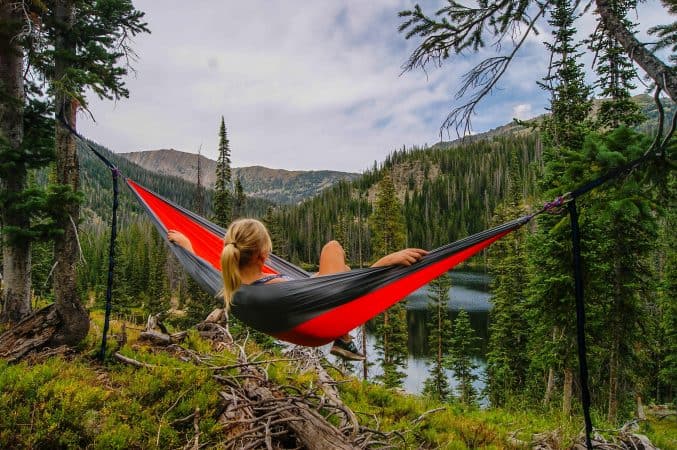
Who wouldn’t love to work outdoors while overlooking the Rockies? This positive experience is possible if your current employer lets you work remotely or you run your own business from your RV.
For most long-term, full-time RVers, income is either from pensions and social security, remote or self-employment, or by workamping. Some do pick up local jobs. Here are 3 great work options for full-time RVers.
Short-term RVers tend to work from savings alone and focus on the travel experience. If you can do this, it’ll produce the most relaxing version of RV living full-time because you’ll have no time constraints within your day.
I have spent many seasons in a workamping position, and while it provides cheap or zero site rent and additional income, it does infringe on your freedom to do as you please. This downside is why this path may not be for everyone.
As time passes, we have made choices to spend less and not work at all, or push ourselves and take on more freelance jobs to stay within our budget.
The longer you travel and live the simple life in your RV, the less pull you feel to check out every store, restaurant, and attraction in any location you visit. A long walk and watching the sunset while sipping a cocktail is enjoyment enough.
The reality is that it does cost money to support a full-time camping lifestyle, and without it, you’ll go nowhere fast.
#5 – Space/Storage
Full-time RVers hear these statement all the time:
“I would kill my spouse or kids if I had to live in a camper with them 24/7!”
“There is no space to store anything in an RV!”
“I would get bored after a month!”
Lucky for us these negative aspects of full-time RVing keep people with the wrong temperament out of our community.
The positive side of these issues is that you learn the art of compromise and flexibility when it comes to these issues.
You learn to purge extraneous items from your camper that you don’t need. I know many full-timers who have plenty of storage space left in their camper. They know that “things” won’t make them happy and a lighter camper costs less in fuel to move.
For those who plan to full-time RV in one location, you should consider finding a campground that allows a park model RV. A park model is the best RV to live in full-time when you desire more space and amenities.
For those who don’t know what a park model is, it’s a large trailer on wheels that looks more like a modular home than an RV. This allows for a standard flushing toilet, laundry facilities, and plenty of space for storage. The downside is that these RVs are not made to move often.
As for boredom, I haven’t personally had this experience. There is just too much to see, fellow campers to chat with, books to read, and family to visit. My mom always says only a boring person gets bored. Think about it.
#6 – Maintenance
It’s not all rainbows and unicorns when you become a full-time RVer. Expect the need to perform maintenance on your camper.
The positive part about this task is that you can lower future repair bills by following a preventative maintenance schedule. When you inspect and clean your RV every week or so, you’ll catch little problems and have the opportunity to fix them before you blow a tire going 65 MPH on the highway.
The negative part about maintenance is that you’ll need a basic understanding of RV plumbing and electrical systems and own the tools to fix minor issues. When you need to hire in a mobile RV handyperson it won’t be cheap, but probably less than taking your RV into a shop.
I can’t count the number of small things I’ve had to fix in my RV. Most of these issues were in direct relation to the vibration of travel or from freezing nights. You can’t escape this negative reality of RV life, but when you prepare properly, you can deal with them immediately, which is a positive thing.
#7 – Campground Issues
When an RVing commercial airs or you see pictures that accompany an article on full-time RVing, it always shows a gorgeous expanse of landscape with nary a soul in sight.
While you can achieve this idyllic scene in some locations, the reality is most places you’ll stay have neighbors well within sight and earshot.
The pros of campgrounds are they typically have a bare minimum of amenities that you appreciate after boondocking it for a week or so. Laundry, bathrooms, and shower houses with endless hot water are wonderful.
Some may have a camp store for necessities and a pool and hot tub for a resort-like treat. Another positive is better security and many offer cabins or rental RVs to allow you to have family get-togethers.
The negatives can sometimes make you feel like turning your back on the RV lifestyle entirely.
Nobody enjoys camping neighbors who love to party all day, then scream at each other all night. Some parks have long-term residents who may be less than upstanding citizens. You could wake up to find your Yeti cooler and bikes missing or the gas siphoned from your car.
I have been witness to all of the above. I expect to see more. Depending on how well a company manages its campground will determine the chance of such events happening to you. While reading campground reviews can help weed out the bad locations, sometimes you can’t avoid less-than-stellar campgrounds.
In such circumstances, keep your belongings inside your camper, lock your doors, and play some music to drown out the screaming. The morning will come, and you can leave, hopefully with a refund.
#8 – Personal Space
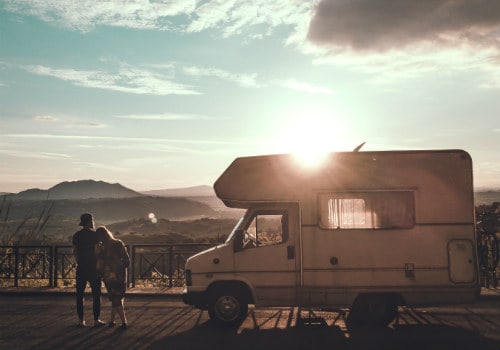
This segment is not going to deal with the typical issues brought up in other full-time RV articles about personal space.
I am going to talk about these two issues because they get such little attention, yet are normal and natural needs. Whether it’s from embarrassment or should go into the “too much information” category, I get these questions in a whisper from many curious full-time RV wannabes, so I am going to address them.
Sex
Most full-time RVers are couples. Couples have sex. But will living in an RV, sometimes only ten feet from your neighbor, cramp your sex life?
It will only if you let it!
I have friends that won’t consider sex during warm nights where camper windows are left open or where passersby may see the camper a-rockin’. I’ll admit that at first, it was strange to get busy when so many people are near. Now I never give it a thought.
Shut the door, windows, and curtains. Turn on some music or your air conditioner and position yourself to work with your camper’s suspension system to alleviate excessive rocking. No need to be loud, save it for a more private location.
Many families full-time RV. Mom and dad have their own methods to sneak in sex when the kids are asleep or outside.
When you arrive at a campsite, indicate to nearby campers that may want to socialize that when your door is shut it means you want your privacy because you are napping or working.
Enjoying all that life has to offer is what full-time RVing is all about. Embrace it!
Bathroom Courtesy
Employing good bathroom courtesy techniques is important when there is no real way to have privacy when using an RV bathroom. A door may shut, but sounds and smells will fill your RV.
Pooping is the other “What do you do?” question I get often.
As a general rule, when in a campground with bathroom facilities you use those for number two action. Using campground bathrooms also keeps your own black tank free from blockages that can occur from too much toilet paper and also reduce tank smell.
When you have a sewer backup or need to empty your tanks, you’ll understand just how nice avoiding poop in your own holding tank is.
I have a small RV with a curtain bathroom door. We only poop in our bathroom in dire emergencies. Very early on we found that no amount of chemicals break down waste and eliminate odor in the three days it took to fill our 20-gallon holding tank, which also held the wastewater from our bathroom sink.
Our rule is “no two in the loo.” We also don’t flush toilet paper but throw it away. We have never had a blockage of any sort and contribute this to our bathroom habits.
Think we are alone in our methods?
Nope, most full-timers do the same. When you spend enough time at one RV park like I did when workamping, you’ll notice the parade of men and women who visit the campground bathrooms.
So feel free to install the Fan-tastic vent in your bathroom to help cover sounds and suck out the smells of number two, and dump in as many chemicals into your holding tank as you want, but the best way to be kind to your travel companions and RV sewer system is to poop elsewhere whenever you can.
#9 – Cooking
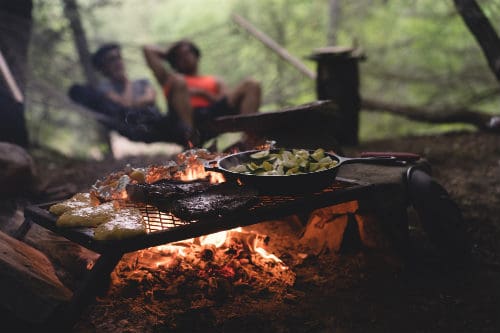
Many considering the full-time RV lifestyle think they’ll have to live on peanut butter and jelly sandwiches or grilled hot dogs because cooking in an RV will be a pain.
They have concerns that they won’t be able to store enough food in small, inefficient camper refrigerators and freezers. There are some negative aspects of storing food and cooking in your RV, especially if you love to cook.
You won’t have counter space for extensive food prep, and while you can enjoy a propane gas stove, don’t expect to have room for more than one pan. Expect your RV interior to heat up or absorb the smells from your cooking quicker than it would in a house.
Many current model RVs do feature large refrigerators like the PolarMax18 by Norcold. Older models will have a fridge that’s almost normal in length but is shallow, which inhibits the amount of food and drink you can keep in there at any given time. The freezer tends to be weak, so your ice cubes may freeze, but your ice cream will remain mushy.
The positives are that it’s easy to overcome many of these issues by changing your cooking methods, and having a cutting board that fits over your kitchen sink to add counter space.
A grill will keep food splatters and heat outside your RV. A crockpot is great for no-fuss meals, and an electric griddle cooks everything from pancakes to steaks.
Most full-time RVers eventually change out the original camper fridge to a standard residential model. While this is great for those who plan to plug into shore power in every location they visit, losing your propane option will leave you unhappy when you want to camp off-grid or stay overnight in a Wal-Mart parking lot.
You’ll manage to find the right combination of fresh-food storage and cooking methods that work best for you, so don’t let this issue sway your decision to start living full time in an RV.
Conclusion
What is the best bit of advice I can give to those considering a full-time RV lifestyle? Relax! You can always change your mind if you find life on the road is not as wonderful as you thought it would be.
Like the couple in the following video, every person will encounter their own pros and cons of fulltime RV living and will make changes based on their experiences. Some RVers go larger, some go smaller, and many just go home. All are okay!
Another bit of advice is to embrace the laid-back, tolerant, happy-go-lucky mental attitude of fellow full-time RVing enthusiasts. I have yet to meet another group of people who have such positive spirits and helpful demeanors, who enjoy the moment and look forward to what experiences tomorrow will bring.
So what’s my biggest regret about my full-time RV life? That I didn’t do it sooner. Any negative I may encounter is blown away by the positives of this wonderful way of life. I plan to live this way as long as I can!
What’s your biggest worry about taking the full-time plunge? Share your concerns in the comments below and see if we can help!.




